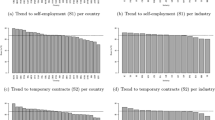Abstract
Using cross-country data, we investigate the determinants of reservation wages and their course over the jobless spell. Higher unemployment benefits lead to higher reservation wages. Further, again consistent with the basic search model, repeated observations on the same individual provide scant evidence of declining reservation wages.
Similar content being viewed by others
Notes
Evaluating the integral and rearranging terms gives
$$\left( {w^r - b} \right)\rho = \left[ {E_w \left( {\left. w \right|w \geqslant w^r } \right) - w^r } \right]\left[ {1 - F\left( {w^r } \right)} \right]\delta ,$$which clarifies the role of the reservation wage in equating the marginal costs and benefits of continued search. In other words, changes in the independent variables affect either the marginal costs or benefits of additional search and produce offsetting changes in the reservation wage.
In 1994 for example some 60,500 such households, or a little over 130,000 adults aged 16 years and above, were interviewed.
Other than for Germany, where we assume it to be October in each year.
Despite the panel structure, however, estimation of a fixed effects specification was ruled out on practical grounds because of insufficient variation in the individual unemployment benefit and job offer variables.
Recall that these are empirical elasticities. Their counterparts derived from a hyper-stylized structural job search model might be higher; see, for example, Addison et al. (2009).
The fact that we are using information on elapsed duration collected at a point in time does, however, raise the issue of length-biased sampling. This over-sampling of individuals with longer durations is a serious problem only if we are seeking to recoup the unemployment duration distribution of the population of unemployed individuals. But note that our results pertain to the stock of unemployed.
References
Addison JT, Centeno M, Portugal P (2009) Unemployment benefits, and reservation wages: key elasticities from a stripped-down job search approach. Economica (forthcoming)
Bloemen H, Stancanelli E (2001) Individual wealth, reservation wages, and transitions into employment. J Labor Econ 19:400–439, (April)
Devine TJ, Kiefer NM (1991) Empirical labor economics—the search approach. Oxford University Press, New York and Oxford
EUROSTAT (1999) European community household panel. Longitudinal users’ database. Waves 1, 2 and 3. Manual. EUROSTAT, Luxembourg
Mortensen DT (1977) Unemployment insurance and job search decisions. Ind Labor Relat Rev 30:505–517, (July)
Prasad E (2003) What Determines the reservation wages of unemployed workers? New Evidence from German Micro Data. IZA Discussion Paper No. 694, June
Author information
Authors and Affiliations
Corresponding author
Appendix
Appendix
Rights and permissions
About this article
Cite this article
Addison, J.T., Centeno, M. & Portugal, P. Do Reservation Wages Really Decline? Some International Evidence on the Determinants of Reservation Wages. J Labor Res 30, 1–8 (2009). https://doi.org/10.1007/s12122-008-9057-y
Received:
Accepted:
Published:
Issue Date:
DOI: https://doi.org/10.1007/s12122-008-9057-y



